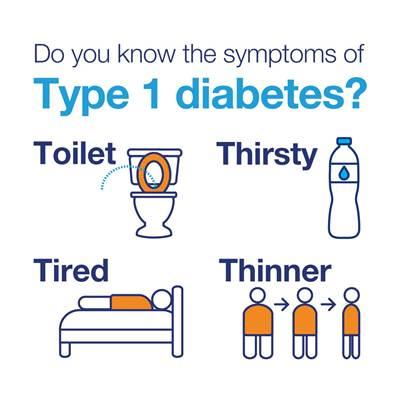Type 1 Diabetes Symptoms | Weight loss is also a frequent symptom of type i diabetes, as tissue will shrink without sugar being stored in it. Symptoms of type 1 diabetes are serious and usually happen quickly, over a few days to weeks. The blood tests include tests for sugar levels and for. If they think you might have diabetes, they'll advise you to go to hospital straight away for an assessment. Type 1 diabetes is usually diagnosed in childhood, adolescence or early adulthood.
Type 1 diabetes signs and symptoms can appear relatively suddenly and may include Type 1 diabetes is very common among men and women in today's age. Some type 1 diabetes symptoms are similar to symptoms of other health conditions. Type 1 diabetes happens when your immune system destroys cells in your pancreas that make insulin. Untreated diabetes can lead to very serious—even fatal—health problems.
The blood tests include tests for sugar levels and for. Once allowed inside, the glucose can then be used by your cells. Without the insulin produced by the pancreas, sugar has difficulty entering the body's cells. It is an autoimmune disorder in which the immune system attacks and destroys healthy tissue in the pancreas which would otherwise be. Fatigue, or feeling constantly tired: Type 1 diabetes is an autoimmune disease that causes the body's pancreas to stop producing insulin. Being diagnosed early and managing your blood. Don't guess—if you think you could have type 1 diabetes, see your doctor right away to get your blood sugar tested. But untreated diabetes affects many major organs, including your heart, blood vessels, nerves, eyes and kidneys. This is often the reason people end up in the hospital or their doctor's office, and type 1 diabetes is then diagnosed. In people with type 1 diabetes, the onset of symptoms can be very sudden, while in type 2 diabetes, they tend to come about more gradually, and sometimes there are no signs at all. Your gp will do a urine test and might check your blood glucose (sugar) level. Symptoms of type 1 diabetes are serious and usually happen quickly, over a few days to weeks.
It takes the glucose that your body converts from carbohydrates in your food and opens your cells so that it can enter them. When type 1 diabetes starts in adulthood, its symptoms usually come on quite suddenly and are the same as those that occur in children with type 1 diabetes; Type 1 diabetes symptoms can come on quickly, particularly in children. Untreated diabetes can lead to very serious—even fatal—health problems. Your gp will do a urine test and might check your blood glucose (sugar) level.

Learn more about the symptoms, causes, diagnosis, treatment, and complications of type 1 diabetes. With type 1 diabetes, your pancreas does not make insulin. You see, insulin usually acts like a gatekeeper: Weight loss is also a frequent symptom of type i diabetes, as tissue will shrink without sugar being stored in it. In people with type 1 diabetes, the onset of symptoms can be very sudden, while in type 2 diabetes, they tend to come about more gradually, and sometimes there are no signs at all. Untreated diabetes can lead to very serious—even fatal—health problems. Your gp will do a urine test and might check your blood glucose (sugar) level. Type 1 diabetes is a common problem faced by men and women. Once allowed inside, the glucose can then be used by your cells. Type 1 diabetes can occur at any age, although it is more common in children and young adults. During digestion, food is broken down into basic type 1 diabetes is diagnosed by a combination of symptoms, a person's age and blood tests. The successive deficiency of insulin leads to increased blood and urine sugar/glucose. Most people develop type 1 diabetes before the age of 30, but it can also occur in older adults.
With type 1 diabetes, your pancreas does not make insulin. Type 1 diabetes (t1d), previously known as juvenile diabetes, is a form of diabetes in which very little or no insulin is produced by the islets of langerhans (containing beta cells) in the pancreas. Type 1 diabetes makes up only about 5 percent of all diabetes cases, according to the centers for disease control and prevention (cdc). Your body has to get energy from somewhere, so will break down fat stores. Type 1 diabetes symptoms can come on quickly, particularly in children.

In people with type 1 diabetes, the onset of symptoms can be very sudden, while in type 2 diabetes, they tend to come about more gradually, and sometimes there are no signs at all. Type 1 diabetes happens most often in children and young adults but can appear at any age. Symptoms of type 1 diabetes are serious and usually happen quickly, over a few days to weeks. There are both signs and symptoms. Type 1 diabetes is an autoimmune condition. Type 1 diabetes symptoms can come on quickly, particularly in children. Here are diabetes symptoms that you should never miss and seek doctor's advice immediately. The symptoms of type 1 diabetes in children and young adults tend to develop quickly over a few weeks or few days. While it can be diagnosed in people who are over 40 years old, this is very rare. Type 1 diabetes develops very quickly, and symptoms are obvious. The successive deficiency of insulin leads to increased blood and urine sugar/glucose. The presence of autoantibodies, even without diabetes symptoms, means the family member is more likely to develop type 1 diabetes. Type 1 diabetes can occur at any age, although it is more common in children and young adults.
Type 1 Diabetes Symptoms: Without the insulin produced by the pancreas, sugar has difficulty entering the body's cells.
Referanse: Type 1 Diabetes Symptoms
Post a Comment